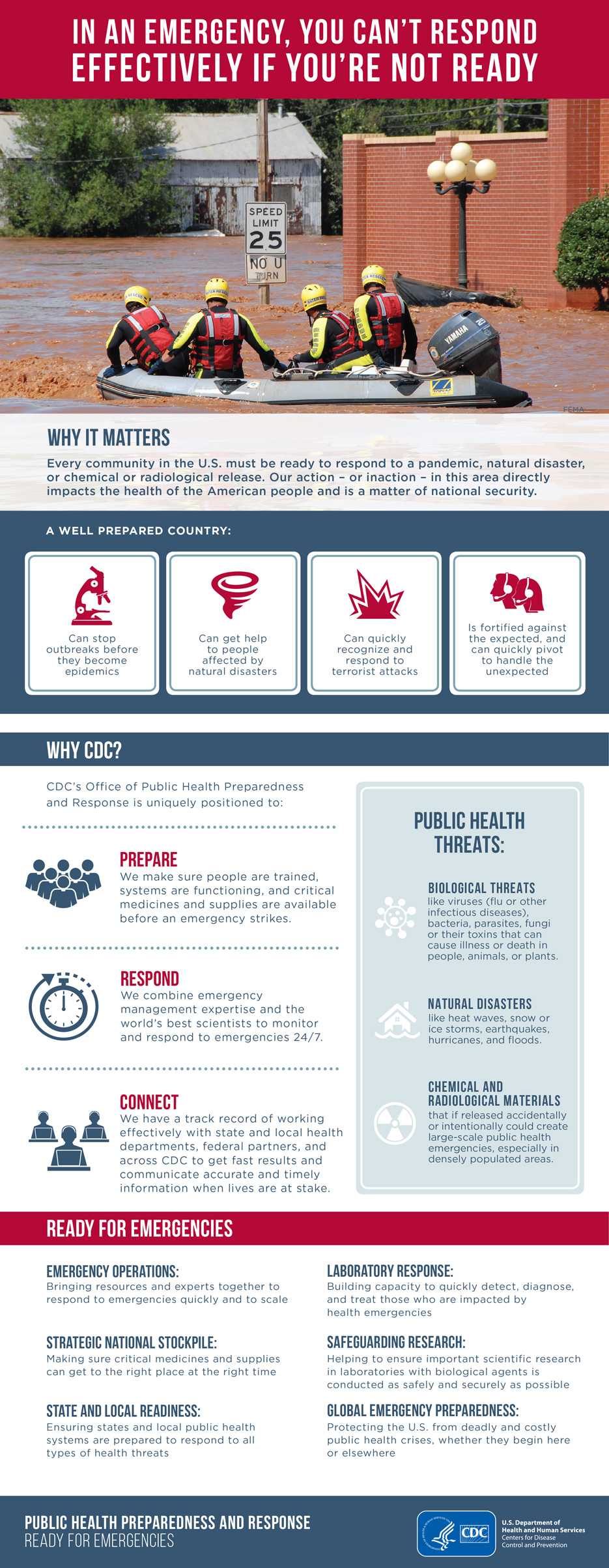In An Emergency, You Can’t Respond Effectively If You’re Not Ready
Text Equivalent
In An Emergency, You Can’t Respond Effectively If You’re Not Ready
Why It Matters
Every community in the U.S. must be ready to respond to a pandemic, natural disaster, or chemicalor radiological release. Our action – or inaction – in this area directly impacts the health of the American people and is a matter of national security.
A Well Prepared Country:
- Can stop outbreaks before they become epidemics
- Can get help to people affected by natural disasters
- Can quickly recognize and respond to terrorist attacks
- Is fortified against the expected, and can quickly pivot to handle the unexpected
Why CDC?
CDC’s Office of Public Health Preparedness and Response is uniquely positioned to:
- Prepare: We make sure people are trained, systems are functioning, and critical medicines and supplies are available before an emergency strikes.
-
Respond: We combine emergency management expertise and the world’s best scientists to monitor
and respond to emergencies 24/7. - Connect: We have a track record of working effectively with state and local health departments, federal partners, and across CDC to get fast results and communicate accurate and timely information when lives are at stake.
Public Health Threats
- Biological threats like viruses (flu or other infectious diseases), bacteria, parasites, fungi or their toxins that can cause illness or death in people, animals, or plants.
- Natural disasters like heat waves, snow or ice storms, earthquakes, hurricanes, and floods.
- Chemical and radiological materials that if released accidentally or intentionally could create large-scale public health emergencies, especially in densely populated areas.
Ready for Emergencies:
- Emergency Operations: Bringing resources and experts together to respond to emergencies quickly and to scale
- Laboratory Response: Building capacity to quickly detect, diagnose, and treat those who are impacted by health emergencies
- Strategic National Stockpile: Making sure critical medicines and supplies can get to the right place at the right time
- Safeguarding Research: Helping to ensure important scientific research in laboratories with biological agents is conducted as safely and securely as possible
- State and Local Readiness: Ensuring states and local public health systems are prepared to respond to all types of health threats
- Global Emergency Preparedness: Protecting the U.S. from deadly and costly public health crises, whether they begin here or elsewhere
- Page last reviewed: February 6, 2017
- Page last updated: February 6, 2017
- Content source:


 ShareCompartir
ShareCompartir
